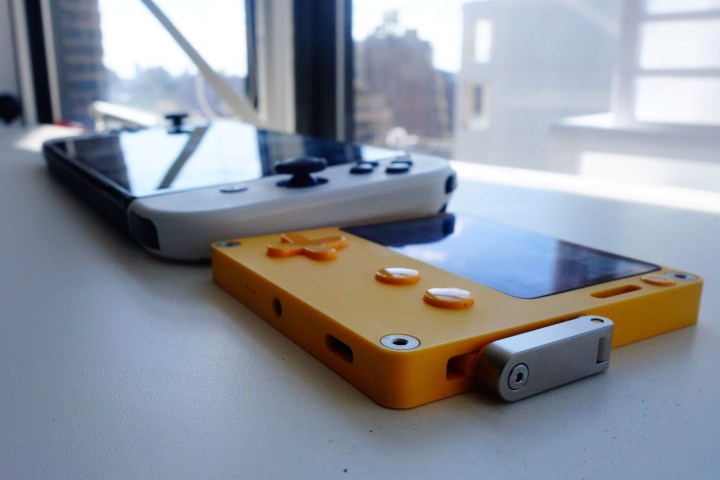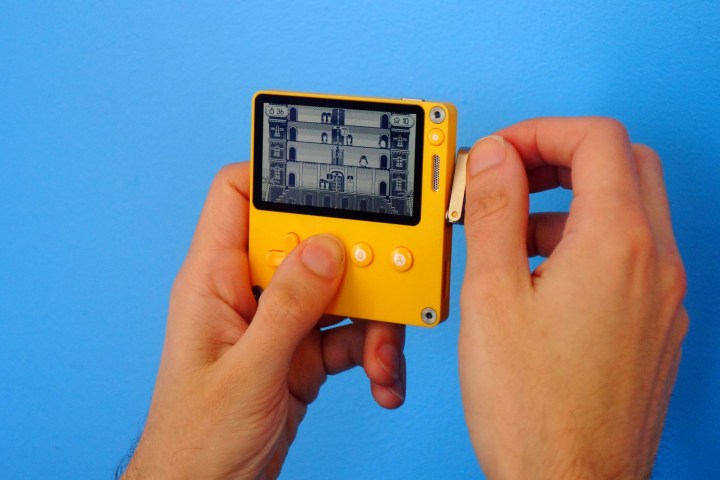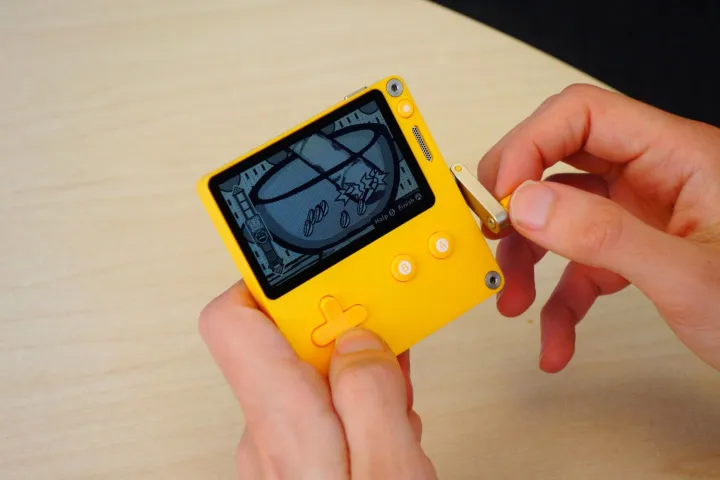Since its launch in 2017, there has rarely been a time when I leave the house without my Nintendo Switch. The portable console became so fundamental to my routine that I had to adopt a messenger bag into my daily fashion choices so I could carry it. When I got my Steam Deck, I ended up carrying both consoles with me, unwilling to fully put down what had become my digital safety blanket.
So when I say the Playdate finally has me leaving my Switch OLED at home, that’s no small feat. Despite being a niche device with far less games available on it, the bright yellow gaming device is filling certain gaps in my life better than Nintendo’s console. That’s because the Playdate is a better gaming handheld than the Switch.
Portable design

I’m choosing my words wisely there. The Nintendo Switch is, without question, the better video game console between the two. The Switch is home to some of the greatest games of all time, whereas the Playdate’s best titles are more toy-like, charming oddities.
But when I think about what I look for most in a handheld device, the Playdate checks all the boxes in a way that no device has since the Nintendo 3DS. On the most basic level, it’s the most truly portable gaming device I’ve ever owned. At roughly three inches by three inches and 84 grams, it’s a device so unobtrusive that I could leave it in a pocket and forget it’s there. Whenever I decide to take my Playdate out instead of my Switch, it’s a literal weight off my shoulders.
With the small size comes an ease of use. If I want to break out my Switch while waiting in line at the DMV, I have to take it out of my bag, remove it from its case, and boot it up. If I suddenly need to stop, I have to rush to do that in reverse, hastily tossing my Switch into my bag to put it away at a moment’s notice. The Playdate is more elegant by comparison: I click the top button once to put it to sleep, magnetically dock its crank, and throw it in my pocket.
That ease of use alone has me choosing the Playdate over the Switch in key situations. While I’m still taking my Switch out anytime I have to commute on public transportation more than a half hour, I’m more likely to leave it behind and take the Playdate if I’m traveling a few stops or doing something that’s going to involve a small patch of downtime, like waiting for a friend to arrive at the movies.
And yes, if you must know, it’s the ideal bathroom companion too. Happy?
Thinking small

It’s not just the size that makes the Playdate a great handheld though: It’s the games. Because the system has so many technical limitations, developers are forced to design small. Even the longest games on the consoles only take an hour or two to complete. That means that the Playdate’s initial season 1 library is filled with micro-games that can be played in a few minutes.
Omaze, for instance, is a tiny maze navigation game where players move a ball through a series of circles using the system’s crank. Even its trickiest levels only take a few minutes of trial and error to complete, making it a great fit for those awkward moments where you’d usually pass the time aimlessly doom scrolling through social feeds.
I’ve been sorely missing that kind of game design in recent years. While the Switch’s best games can work both for long sit-downs or in small chunks, I’ve found myself nostalgic for Game Boy titles that were built with short play sessions in mind. I usually have to gamble with mobile games to recreate that experience, which can be a minefield due to microtransactions. The Playdate’s best games call back to the portable era with high score-focused arcade games where rounds last just a few minutes, but the hooks are so strong that you feel compelled to play over and over.

All of the Playdate’s strengths came together for me recently when I went to get a haircut. I can walk to my barbershop, but there’s always that awkward 10-minute wait where I find myself looking for a way to kill time. Instead of bringing my Switch, I slipped my Playdate into my jacket’s chest pocket. When I got there, I fired up Hyper Meteor, a crank-controlled version of Asteroids, and did three quick rounds over the course of 10 minutes. When my barber called me to the chair, I turned it off and dropped it in my pants pocket without missing a beat.
While the Playdate’s a bit of a one-off gimmick, I find myself wishing there was more space for small-scale gaming tech like it. My phone fills that gap, but I’ve discovered that I sincerely enjoy carrying around a dedicated gaming device that’s built around bite-sized play. There are still spaces in my life where I want to play a low-stakes arcade game for two minutes with as little fuss as possible. The Playdate is the perfect device for that, and you can bet that if I show up to your wedding this summer, it’ll be hiding in my handkerchief pocket.



